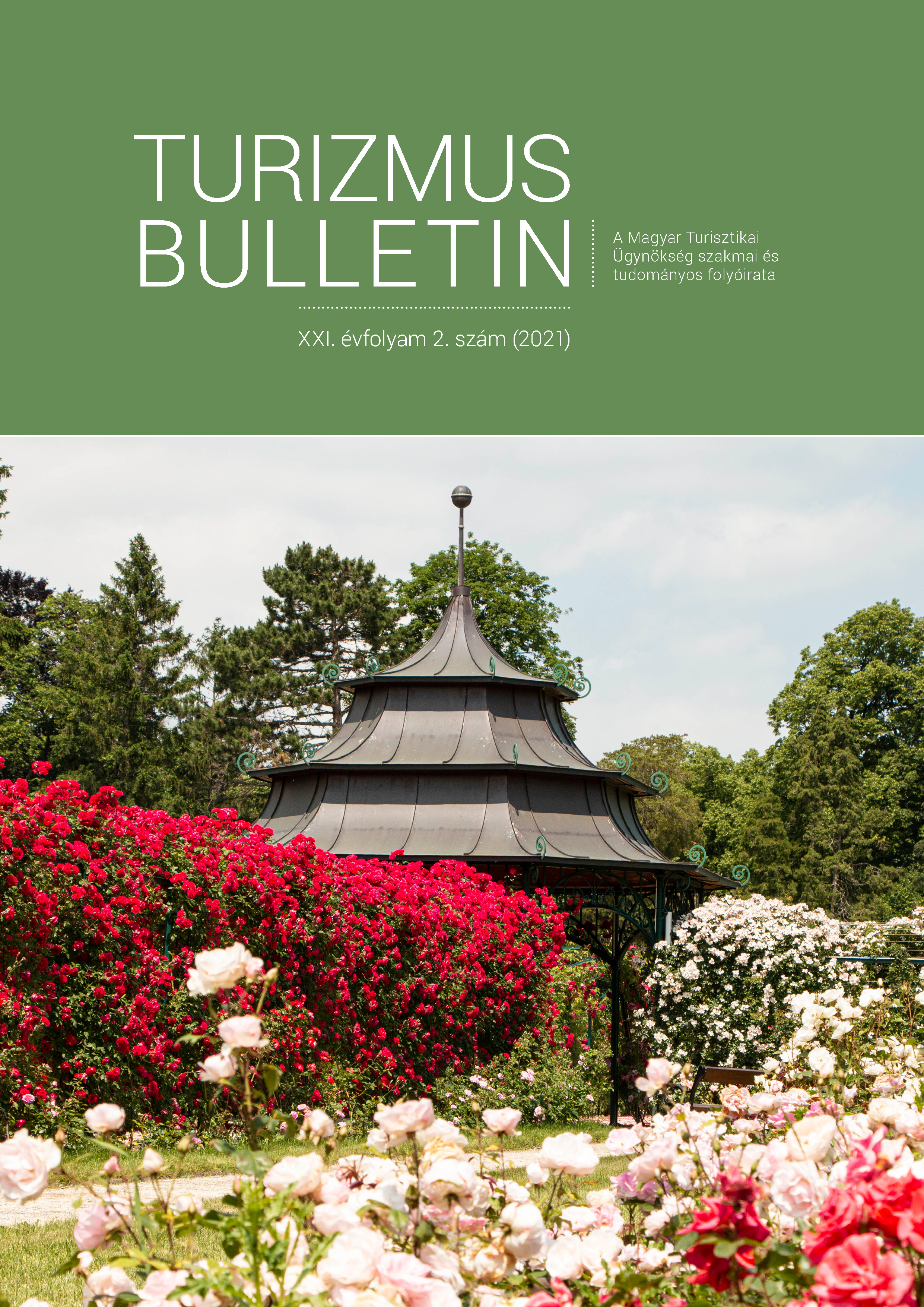Smart tourism and smart events reflected by the Székesfehérvár Royal Days
DOI:
https://doi.org/10.14267/TURBULL.2021v21n2.4Keywords:
smart tourism, smart events, Royal Days, SzékesfehérvárAbstract
The impact of digitalisation on the tourism industry is indisputable on both the demand and the supply side. Typically, the booking of services and the interpretation of attractions have become the focus of online and digital solutions, but in the case of events, all of these solutions can play a role. It can also be seen that, in the life of larger cities, smart tourism applications are popular, but does this apply to smaller domestic cities and countryside destinations? The examination of all these topics is the focus of our present article, addressing the following research question: What can smart tourism mean in the case of Székesfehérvár and how can the demand for a smart event be characterized in terms of the Royal Days? To examine the questions, we conducted qualitative in-depth expert interviews with 13 key service providers, as well as demand-side research using a questionnaire with the help of the local Destination Management Organization (DMO), reaching 414 meaningful answers among visitors at the 2019 Royal Days.
References
ALT, R. – ZIMMERMAN, H. (2015): Electronic Markets on ecosystems and tourism. Electronic Markets. 25(3). pp. 169–174. https://doi.org/10.1007/s12525-015-0197-7
ARENAS, A. E. – GOH, J. M. – URUEÑA LÓPEZ, A. (2019): How does IT affect design centricity approaches: Evidence from Spain’s smart tourism ecosystem. International Journal of Information Management. 45. pp. 149–162. https://doi.org/10.1016/j.ijinfomgt.2018.10.015
BAL, C. – FLECK, N. (2016): Connected Stadium: A Pillar for Football Clubs’ Marketing Development? In: Plewa, C. – Conduit, J. (eds): Making a Difference Through Marketing. Springer, Singapore. pp. 43–58. https://doi.org/10.1007/978-981-10-0464-3_4
BOES, K. – BUHALIS, D. – INVERSINI, A. (2015): Conceptualizing Smart Tourism Destination Dimensions. In: Tussyadiah, I. – Inversini, A. (eds): Information and Communication Technologies in Tourism 2015. Springer, Cham. pp. 391–403. https://doi.org/10.1007/978-3-319-14343-9_29
BOROS K. (2019): Konferenciaturizmus. In: Irimiás A. – Jászberényi M. – Michalkó G. (szerk.): A turisztikai termékek innovatív fejlesztése. Akadémiai Kiadó, Budapest. pp. 50–61. https://doi.org/10.1556/9789634544081
BUHALIS, D. – AMARANGGANA, A. (2014): Smart Tourism Destinations. In: Xiang, Z. – Tussyadiah, I. (eds): Information and Communication Technologies in Tourism 2014. Springer, Heidelberg. pp. 553–564. https://doi.org/10.1007/978-3-319-03973-2_40
BUHALIS, D. – AMARANGGANA, A. (2015): Smart Tourism Destinations Enhancing Tourism Experience Through Personalisation of Services. In: Tussyadiah, I. – Inversini, A. (eds): Information and Communication Technologies in Tourism 2015. Springer, Heidelberg. pp. 377–389. https://doi.org/10.1007/978-3-319-14343-9_28
DEL VECCHIO, P. – MELE, G. – NDOU, V. – SECUNDO, G. (2018): Creating value from Social Big Data: Implications for Smart Tourism Destinations. Information Processing & Management. 54(5). pp. 847–860. https://doi.org/10.1016/j.ipm.2017.10.006
GANTI, R. K. – YE, F. – LEI, H. (2011): Mobile crowdsensing: current state and future challenges. IEEE Communications Magazine. 49(11). pp. 32–39. https://doi.org/10.1109/mcom.2011.6069707
GRETZEL, U. – SIGALA, M. – XIANG, Z. – KOO, C. (2015): Smart tourism: foundations and developments. Electronic Markets. 25(3). pp. 179– 188. https://doi.org/10.1007/s12525-015-0196-8
GRETZEL, U. – ZHONG, L. – KOO, C. (2016): Application of smart tourism to cities. International Journal of Tourism Cities. 2(2). pp. 216–233. https://doi.org/10.1108/IJTC-04-2016-0007
HAPP É. – IVANCSÓNÉ HORVÁTH ZS. – KUPI M. (2020): Digitális eszközök és módszerek használatának marketingszempontú feltáró elemzése a magyar turisták körében. Turizmus Bulletin. 20(2). pp. 4–13. DOI: 10.14267/turbull.2020v20n2.1
HÖJER, M. – WANGEL, J. (2015): Smart Sustainable Cities: Definition and Challenges. In: Hilty, L. – Aebischer, B. (eds): ICT Innovations for Sustainability. Advances in Intelligent Systems and Computing. 310. Springer, Cham. pp. 333–349. https://doi.org/10.1007/978-3-319-09228-7_20
KOVÁCS L. (2020): Kozmetikai márkák és divatmárkák – márkaasszociációs vizsgálatok eredményei. In: Kovács L. (ed): Határterületek 2019. Savaria University Press, Szombathely. pp. 105–118.
LEE, J.-S. – LEE, C.-K. – YOON, Y. (2009): Investigating differences in antecedents to value between first-time and repeat festival-goers. Journal of Travel & Tourism Marketing. 26(7). pp. 688–702. https://doi.org/10.1080/10548400903284511
LOPEZ DE ÁVILA, A. (2015): Smart destinations: XXI century tourism. ENTER2015 Conference on Information and Communication Technologies in Tourism, Lugano, Switzerland.
PAPP-VÁRY Á. (2014): Márkázott szórakoztatás. A termékmegjelenítés nemzetközi és hazai alkalmazása. Akadémiai Kiadó, Budapest. https://doi.org/10.1556/9789630597913
PARK, J. H. – LEE, C. – YOO, C. – NAM, Y. (2016): An analysis of the utilization of Facebook by local Korean governments for tourism development and the network of smart tourism ecosystem. International Journal of Information Management. 36(6). pp. 1320–1327. https://doi.org/10.1016/j.ijinfomgt.2016.05.027
SMITH, M. – MacLEOD, N. – ROBERTSON, M. H. (2010): Key Concepts in Tourist Studies. Sage, London. http://dx.doi.org/10.4135/9781446251027
SZMIGIN, I. – BENGRY-HOWELL, A. – MOREY, Y. – GRIFFIN, C. – RILEY, S. (2017): Socio-spatial authenticity at co-created music festivals. Annals of Tourism Research. 63. pp. 1–11. https://doi.org/10.1016/j.annals.2016.12.007
TARI A. (2017): Bátor generációk – Szorongok tehát vagyok. Tericum Kiadó, Budapest.
TIAN, B. – YAO, Q. – GU, Y. – WANG, K. – LI, Y. (2011): Video processing techniques for traffic flow monitoring: A survey. Proceedings of the 14th International IEEE Conference on Intelligent Transportation Systems (ITSC), Washington, DC. pp. 1103–1108. https://doi.org/10.1109/ITSC.2011.6083125
TORRES, E. N. – LUGOSI, P. – ORLOWSKI, M. – RONZONI, G. (2018): Consumer-led experience customization: A socio-spatial approach. Journal of Service Management. 29(2). pp. 206– 229. https://doi.org/10.1108/JOSM-06-2017-0135
XIA, W. – XIANG, (R.) L.– FENG, Z. – JINHE, Z. (2016): How smart is your tourist attraction?: Measuring tourist preferences of smart tourism attractions via a FCEM-AHP and IPA approach. Tourism Management. 54. pp. 309–320. https://doi.org/10.1016/j.tourman.2015.12.003
XIANG, Z. – FESENMAIER, D. R. (2017): Big data analytics, tourism design and smart tourism. In: Xiang, Z. –Fesenmaier, D. R. (eds.): Analytics in Smart Tourism Design, Tourism on the Verge. Springer International Publishing Switzerland. pp. 299–307. https://doi.org/10.1007/978-3-319-44263-1_17
ZHANG, L. (2012): Smart tourism: The coming age of customization and intelligent public services. Journal of Tourism Tribune. 27(2). pp. 3–5.
Internetes források
ALBA INNOVÁR (2020): https://albainnovar.hu/, Letöltve: 2020. augusztus 18.
KIRÁLYOK VÁROSA (2020): Teendők. https://kiralyokvarosa.eu/desktop/page.php?p=teendok&lang=hun, Letöltve: 2020. augusztus 19.
KSH (2108): TOP30 település a kereskedelmi szálláshelyek vendégéjszakái alapján. https://www.ksh.hu/interaktiv/kersza/szallashelyek.html?utm_source=kshhu&utm_medium=banner&utm_campaign=home, Letöltve: 2020. november 15.
YOO, T. (2012): Korea leading global smart revolution. Korea Times. http://www.koreatimes.co.kr/www/tech/2021/03/133_123643.html, Letöltve: 2021. május 28.

